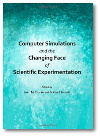While Thomas Kuhn's theory of scientific revolutions does not specifically deal
with validation, the validation of simulations can be related in various ways to
Kuhn's theory: 1) Computer simulations are sometimes depicted as located between
experiments and theoretical reasoning, thus potentially blurring the line
between theory and empirical research. Does this require a new kind of research
logic that is different from the classical paradigm which clearly distinguishes
between theory and empirical observation? I argue that this is not the case. 2)
Another typical feature of computer simulations is their being ``motley''
(Winsberg 2003) with respect to the various premises that enter into
simulations. A possible consequence is that in case of failure it can become
difficult to tell which of the premises is to blame. Could this issue be
understood as fostering Kuhn's mild relativism with respect to theory choice? I
argue that there is no need to worry about relativism with respect to computer
simulations, in particular. 3) The field of social simulations, in particular,
still lacks a common understanding concerning the requirements of empirical
validation of simulations. Does this mean that social simulations are still in a
pre-scientific state in the sense of Kuhn? My conclusion is that despite ongoing
efforts to promote quality standards in this field, lack of proper validation is
still a problem of many published simulation studies and that, at least large
parts of social simulations must be considered as pre-scientific.
Published: Beisbart, C. and Saam, N. J. (Ed.): Computer Simulation Validation - Fundamental Concepts, Methodological Frameworks, and Philosophical Perspectives, Springer 2019.
 (collaborative work with Juan Duran)
(collaborative work with Juan Duran) Employing computer simulations for the study of the evolution of altruism has
been popular since Axelrod's book "The Evolution of Cooperation". But have the
myriads of simulation studies that followed in Axelrod's footsteps really
increased our knowledge about the evolution of altruism or cooperation? This
book examines in detail the working mechanisms of simulation based evolutionary
explanations of altruism. It shows that the "theoretical insights" that can be
derived from simulation studies are often quite arbitrary and of little use
for the empirical research. In the final chapter of the book, therefore, a set
of epistemological requirements for computer simulations is proposed and
recommendations for the proper research design of simulation studies are made.
Published: ontos Verlag Heusenstamm 2008.
Employing computer simulations for the study of the evolution of altruism has
been popular since Axelrod's book "The Evolution of Cooperation". But have the
myriads of simulation studies that followed in Axelrod's footsteps really
increased our knowledge about the evolution of altruism or cooperation? This
book examines in detail the working mechanisms of simulation based evolutionary
explanations of altruism. It shows that the "theoretical insights" that can be
derived from simulation studies are often quite arbitrary and of little use
for the empirical research. In the final chapter of the book, therefore, a set
of epistemological requirements for computer simulations is proposed and
recommendations for the proper research design of simulation studies are made.
Published: ontos Verlag Heusenstamm 2008. Eric Voegelin believed that a morally acceptable and in the long run
successful political order (which meant for the emigrant Voegelin
primarily an order that is resistant to totalitarianism) can only be
built on the foundation of a healthy religiosity of the citizens and
the political leaders. The question of what a healthy
religiosity is was
examined by Voegelin by recurring to intellectual history and to
the philosophy of consciousness. In my book I offer a detailed
criticism Voegelin's philosophy of consciousness and of his
concept of political order.
Published: GRIN Verlag München 2007.
Eric Voegelin believed that a morally acceptable and in the long run
successful political order (which meant for the emigrant Voegelin
primarily an order that is resistant to totalitarianism) can only be
built on the foundation of a healthy religiosity of the citizens and
the political leaders. The question of what a healthy
religiosity is was
examined by Voegelin by recurring to intellectual history and to
the philosophy of consciousness. In my book I offer a detailed
criticism Voegelin's philosophy of consciousness and of his
concept of political order.
Published: GRIN Verlag München 2007.
 Hans Kelsen's thorough critique of Eric Voegelin's "New Science of Politcs" is -
in my oppinion - the best commentary on Voegelin that has been written so far.
English (German commentary): Hans Kelsen: A New Science of Politics? Hans Kelsens Reply to Eric Voegelin's "New Science of Politics", ed. by Eckhart Arnold, ontos Verlag Heusenstamm 2004.Spanish: Hans Kelsen: ¿Una nueva ciencia de la política? Réplica a Eric Voegelin, Editado por Eckhart Arnold, Traducio por Isolda Rodríguez Villega y Jaquín Etorena, katz Editores Buenos Aires 2006.
Hans Kelsen's thorough critique of Eric Voegelin's "New Science of Politcs" is -
in my oppinion - the best commentary on Voegelin that has been written so far.
English (German commentary): Hans Kelsen: A New Science of Politics? Hans Kelsens Reply to Eric Voegelin's "New Science of Politics", ed. by Eckhart Arnold, ontos Verlag Heusenstamm 2004.Spanish: Hans Kelsen: ¿Una nueva ciencia de la política? Réplica a Eric Voegelin, Editado por Eckhart Arnold, Traducio por Isolda Rodríguez Villega y Jaquín Etorena, katz Editores Buenos Aires 2006.
